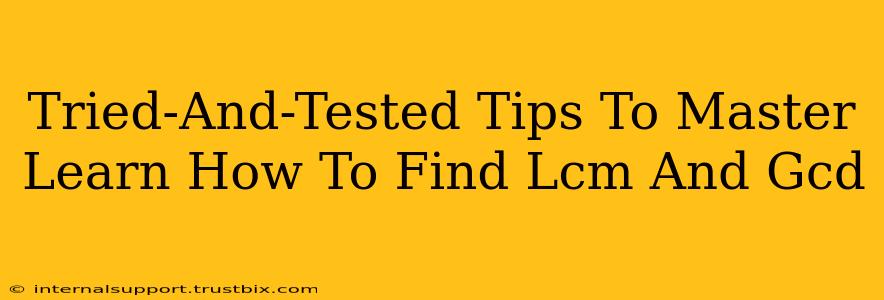Finding the Least Common Multiple (LCM) and Greatest Common Divisor (GCD) might seem daunting at first, but with the right approach and consistent practice, mastering these concepts becomes surprisingly straightforward. This guide provides tried-and-tested tips to help you conquer LCM and GCD calculations and understand their applications.
Understanding the Fundamentals: LCM and GCD Defined
Before diving into techniques, let's solidify our understanding of LCM and GCD.
What is GCD?
The Greatest Common Divisor (GCD) of two or more integers is the largest positive integer that divides each of the integers without leaving a remainder. For example, the GCD of 12 and 18 is 6 because 6 is the largest number that divides both 12 and 18 evenly.
What is LCM?
The Least Common Multiple (LCM) of two or more integers is the smallest positive integer that is divisible by all the integers. For instance, the LCM of 4 and 6 is 12, as 12 is the smallest number divisible by both 4 and 6.
Methods for Finding GCD and LCM
Several methods can efficiently calculate GCD and LCM. Here are some popular and effective techniques:
1. Prime Factorization Method
This method involves breaking down the numbers into their prime factors.
Finding GCD using Prime Factorization:
- Prime Factorize: Find the prime factorization of each number. For example: 12 = 2² x 3 and 18 = 2 x 3².
- Identify Common Factors: Identify the common prime factors and their lowest powers. In this case, the common factors are 2 and 3. The lowest power of 2 is 2¹ and the lowest power of 3 is 3¹.
- Multiply Common Factors: Multiply the common factors with their lowest powers to find the GCD. GCD(12, 18) = 2¹ x 3¹ = 6
Finding LCM using Prime Factorization:
- Prime Factorize: Prime factorize each number (as above).
- Identify All Factors: Identify all the prime factors present in either number, including their highest powers. For 12 and 18, the factors are 2² and 3².
- Multiply All Factors: Multiply all the prime factors with their highest powers to find the LCM. LCM(12, 18) = 2² x 3² = 36
2. Euclidean Algorithm
The Euclidean algorithm is a highly efficient method, especially for larger numbers. It's based on repeated application of the division algorithm.
Finding GCD using Euclidean Algorithm:
- Divide and Conquer: Divide the larger number by the smaller number and find the remainder.
- Repeat: Replace the larger number with the smaller number and the smaller number with the remainder. Repeat this process until the remainder is 0. The last non-zero remainder is the GCD.
Let's find the GCD of 48 and 18:
- 48 ÷ 18 = 2 with a remainder of 12
- 18 ÷ 12 = 1 with a remainder of 6
- 12 ÷ 6 = 2 with a remainder of 0
Therefore, the GCD(48, 18) = 6
3. Using the Formula: LCM(a, b) * GCD(a, b) = a * b
Once you've found either the GCD or LCM using any method, you can easily calculate the other using this formula. This is a valuable shortcut.
Practice and Application
The key to mastering LCM and GCD lies in consistent practice. Work through various examples using different methods to build your understanding and speed. Many online resources and textbooks offer practice problems.
Real-World Applications
LCM and GCD are not just abstract mathematical concepts; they have practical applications in various fields:
- Scheduling: Finding the LCM is crucial in scheduling events that occur at different intervals (e.g., buses arriving at a stop).
- Fraction Simplification: GCD helps simplify fractions to their lowest terms.
- Measurement: LCM helps in finding a common unit for measurement (e.g., finding the shortest length that can be measured using two different rulers).
- Computer Science: GCD and LCM are used in cryptography and other algorithms.
By understanding the fundamental principles and employing these methods, you'll be well-equipped to tackle any LCM and GCD problem with confidence. Remember, practice makes perfect!

